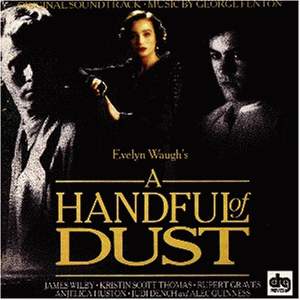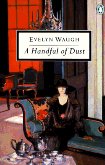OVERVIEW:
Containing many of the qualities typical of Waugh's satirical novels,
HANDFUL OF DUST tells the story of Tony Last, proud owner of a
Victorian gothic country house, HETTON. Frustrated by his old-fashioned
ways, his wife, LADY BRENDA, becomes infatuated with a young socialite,
JOHN BEAVER, and deserts Tony and the family after their son, JOHN
ANDREW, is killed in a hunting accident. Tony refuses to grant her a
divorce, fearing the cost of alimony and the consequent loss of his
beloved Hetton. He departs for an extended trip to Brazil and
accompanies a casual acquaintance, DR. MESSINGER, up the Amazon. They
run into trouble; Tony falls ill and Messinger is drowned. At the
point of death Tony is rescued by a mad recluse, MR. TODD, who has
lived in the jungle for nearly 60 years. Tony recovers but is forced
to become Mr. Todd's 'companion', spending the rest of his life
reading aloud the works of Dickens. In England, he is reported dead
and Brenda marries a politician, JOCK GRANT-MENZIES, her relationship
with Beaver having faded. Hetton passes into the hands of Tony's
cousin, RICHARD LAST.
An 'Alternative Ending' offers a happier version of events. Tony
returns to find Hetton entirely redecorated in his absence and to be
met by a repentant Brenda...
DETAIL:
In Black Mischief, implicitly Waugh says to his readers: "You
liberals, colonialists, and decent agnostic pragmatists--you laugh at
my jokes, and are excited like me by wealth, sex, barbarity, and power--but
can you face the implications, for society and for yourselves, of
identifying with Basil Seal and recognizing him as Everyman? If you
cannot, then perhaps I have resources you lack. However, I leave it to
you to find out what they are."
Waugh's next novel, A Handful of Dust, makes essentially the same
points by exactly opposite means. It too mingles an English upper-class
world with that of a primitive people, but in proportions that reverse
those of Black Mischief. Like, Basil, its hero Tony Last, is the only
character to unite the two worlds; but unlike Basil he is naive,
honorable, and innocent, the creature, not the maker, of circumstance.
Yet he is a universal figure, too, in his fashion. What sort of world
is it, the reader asks, in which such decency can end up as wretchedly
as Tony does? And the answer, of course, is, the same sort of world as
that in which a man like Basil Seal can flourish a world
comprehensively in need of redemption.
When the novel opens, Tony Last's life seems perfect. He is married to
Brenda; has a son, John Andrew, and an ugly neo-Gothic country house
called Hetton; and loves all three. But Brenda takes a lover, a
worthless young man called John Beaver. She spends an increasingly
large amount of time in a flat she has rented in London, and during
one of her absences her son is killed in a riding accident. A family
friend, Bruce Scott-Menzies, brings her the news. Momentarily she
thinks he is referring to Beaver, and when she realizes that he means
John Andrew she says "Thank God" and bursts into tears.
After the boy's funereal, she leaves Tony and they agree on a divorce
for which Tony is to provide the evidence. After a disastrous trip to
Brighton, on which he and his supposed mistress are accompanied by her
little girl, Tony learns that Brenda, at Beaver's instigation, is
demanding such heavy alimony that he will have to sell Hetton; so he
calls off the divorce and sails to Latin America with an absurd
explorer, Dr. Messinger, in search of a mythical lost city. He has a
futile shipboard romance with a young Catholic girl, and the
expedition goes fatally wrong. The final stages of the novel alternate
between Tony's fever dreams in the jungle and Brenda's deprivations in
London after Beaver deserts her. Brenda at least ends up married to
Bruce Scott-Menzies, now an M.P., whereas Tony is imprisoned by a
madman, Mr. Todd, who forces him to read Dickens aloud for the
remainder of his days.
The novel takes its title from Eliot's poem The Waste Land, certain
features which reappear in it. Thus The Waste Land represents the
decay of ancient fertility myths into such degenerate forms as telling
fortunes with Tarot cards; the fortune-teller in A Handful of Dust
reads the soles of her clients feet. The Waste Land looks behind the
medieval Arthurian story-cycle to the Celtic rituals from which it
derives. A Handful of Dust gives us a degraded modern version of the
same material: Tony is King Arthur, Brenda Guinevere, and Beaver her
lover, Lancelot. (The rooms in Hetton are named after the characters
in Tennyson's heavily Victorian version of the same story). And just
as Eliot's poem contrasts the "Unreal City" of London with
the great cities of legend--Jerusalem, Athens, Alexandria, Vienna: all
"fallen," all finally unreal--so Waugh's novel ends with
Tony, like a knight searching from the Holy Grail, vainly seeking his
mythical city and finding nothing but his own special hell on earth.
This sustained body of literary allusion gives A Handful of Dust
greater range of ironic implication than Waugh was ever again to
attempt. It is in parts exceptionally funny. The vicar of Tony's
church had originally written his sermons while serving in India, and
he mindlessly repeats them each Sunday at Hetton to hilarious effect;
but his wordy fatuities about the unity of the servants of a far-flung
empire have a cruel bearing on the appalling isolation that is Tony's
ultimate fate. At least as funny are the absurdities of Tony's
supposedly adulterous weekend with Milly and her horrid daughter. The
final section is brilliantly edited. The text cuts between Tony's
sufferings in the jungle and the loneliness of Brenda in London (or
alternatively between Bruce Scott-Menzies asking fatuous questions in
the Commons about Japanese pork pies and the explorers' Indian guides
gorging themselves on pig meat after a hunt). Finally, in a
phantasmagoric fever-dream Tony blends the worlds of London, the
jungle, and his dream city (a fantastically elaborated Hetton) only to
wake in the hands of Mr. Todd, and to the knowledge he has gained
"in the forest where time is different. There is no City" (ch.
6).
Two points remain. Clearly this story of marital betrayal bears
closely on Waugh's personal experience. Putting it on public record,
however indirectly, was a new instance of his willingness to outface
the public. It is remarkable for its generosity toward Brenda. The
moment when she discovers that Beaver is alive and John Andrew is dead
is handled with great delicacy. Once she has made her terrible remark,
she weeps helplessly, pressing her forehead against the gilt back of a
hard little empire chair. Her behavior is clearly compulsive. Later
she is for a time impoverished and demoralized, but her real
punishment has been to see her situation for what it is from the
beginning. Nor is this handled with any vindictiveness. Waugh gives
Brenda the dignity of self-knowledge. "I was never one for making
myself expensive," she says in chapter 3 when Beaver lets her see
herself home. Wit of this kind is a sign of grace in Waugh, though not
quite the grace that sanctifies. In all his later writings (with one
exception in Brideshead Revisited) he remained uncensoriously
compassionate in his attitude to faithless women. For a humiliated
cuckold, the stance was a fundamentally honorable one.
Far more problematical is the treatment of Tony. The Mr. Todd sequence
was originally published in the United States as a short story before
the work of the novel began. Consequently an American serialization of
A Handful of Dust has a different ending, in which Tony returns to
London, is reunited with Brenda, and cynically takes over her flat in
London in order to prosecute his own infidelities. The novelist Henry
Yorke felt the English version too "fantastic . . . . The first
part is . . . a real picture of people one has met and may at any
moment meet again." With his own recent travels in South America
in mind (he actually met the original Mr. Todd in 1933), Waugh replied
that for him savages were just such a people: "the Amazon stuff
had to be there" (Letters, p. 88). The American version is
certainly more urbane, but its effect is cynically to restore, not
subvert, civilization. Waugh's scheme, however, was to show "Gothic
man in the hands of savages--first Mrs Beaver [John's mother] etc.
then the real ones." Even when Tony's happy cousins inherit
Hetton, the vixens on their silver-fox farm keep having their brushes
bitten off; barbarism can never really be kept at bay. What Tony
learns but fails to understand is that, in the words of the Epistle to
the Hebrews: "we have not here a permanent city but we seek that
which is to come" (13: 14). Waugh's strength as a novelist is
that, precisely as a sophisticated inhabitant of the city of man, he
was prepared to face all the consequences of its being, in the end, an
illusion.
© Gregg.A.Hecimovich@vanderbilt.edu
|






